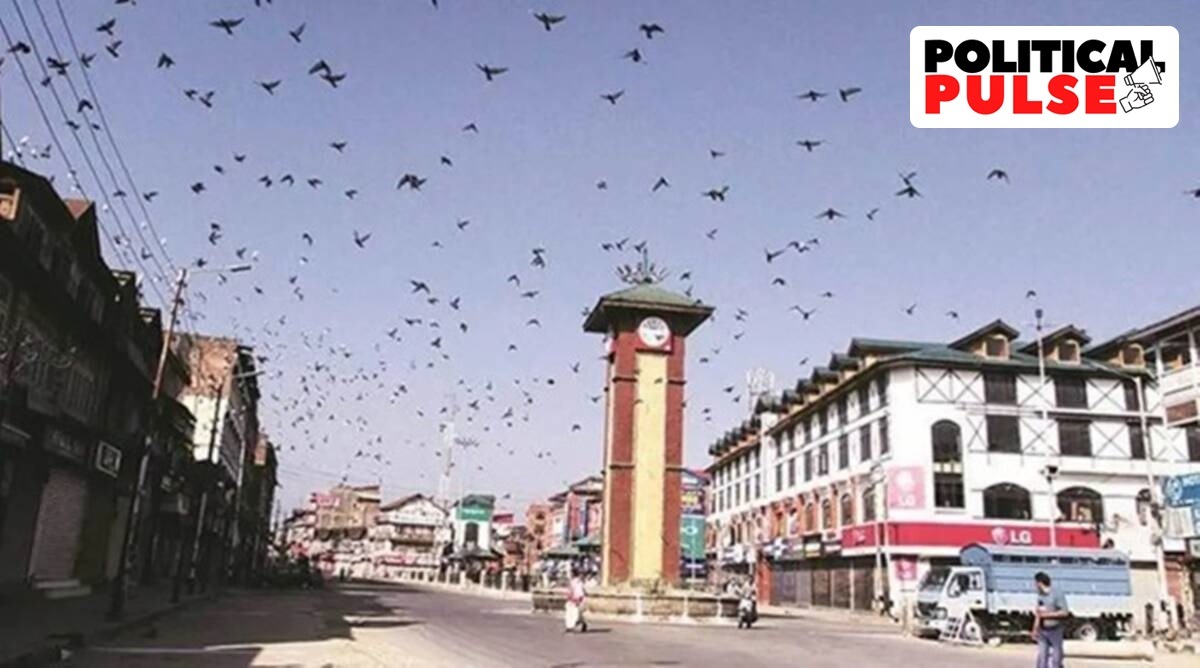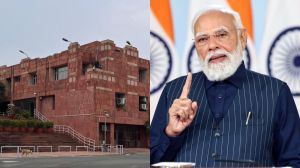J&K Delimitation: As seen from the side of Gujjars, Bakarwals
The commission has proposed 15 new constituencies from the 43 across Jammu division, and deleted nine. The BJP had won 25 seats in the last Assembly polls in 2014 compared to only 11 in the 2008 elections.
 Of the new demarcated constituencies, seven have been reserved for Scheduled Castes and six for Scheduled Tribes, mainly nomadic Gujjars and Bakarwals who are Muslims. (File photo)
Of the new demarcated constituencies, seven have been reserved for Scheduled Castes and six for Scheduled Tribes, mainly nomadic Gujjars and Bakarwals who are Muslims. (File photo)THE Delimitation Commission’s proposals for Jammu and Kashmir, redrawing constituencies and reserving some for Scheduled Castes and Scheduled Tribes, has meant an increase in the number of constituencies with majority Hindu population in the border Rajouri district. It also marks the first ever political reservation in J&K for Gujjars and Bakarwals, who form the third largest ethnic group in the UT, after the Kashmiris and Dogras.
The commission has proposed 15 new constituencies from the 43 across Jammu division, and deleted nine. The BJP had won 25 seats in the last Assembly polls in 2014 compared to only 11 in the 2008 elections.
The new seats are Shri Mata Vaishno Devi, Ramgarh, Kathua South, Kathua North, Jammu South, Bahu, Bhawlal-Nagrota, Jammu North, Khour, Kalakote-Sunderbani, Mughal Maidan, Paddar, Doda West, Udhampur West, Udhampur East. The deleted include Kalakote, Chhamb, Raipur-Domana, Suchegtarh, Gandhi Nagar, Nagrota, Gool-Arnas and Inderwal.
Of the new demarcated constituencies, seven have been reserved for Scheduled Castes and six for Scheduled Tribes, mainly nomadic Gujjars and Bakarwals who are Muslims. Besides, with their combined population of over 25% to 44%, across seats, they can play a key role in at least 25 other constituencies.
Except for the 2014 polls, when two PDP and one BIP nominee had won, these seats have traditionally supported the National Conference or the Congress. Following the Centre’s order reserving seats for them, the Gujjars and Bakarwals can be expected to be favourably disposed towards the BJP.
Poonch district
All the three Assembly constituencies of Poonch-Haveli, Mendhar and Surankote are proposed to be reserved for STs. Barring once or twice, Poonch-Haveli and Mendhar have always elected non-Gujjar Muslims, including those of Kashmir origin, owing allegiance to the NC and Congress.
Rajouri district
Only Nowshera Assembly constituency in this border district earlier had a majority Hindu population. Now, with the shifting of Sunderbani and Siot tehsils from Nowshera to Kalakote-Sunderbani, the latter seat in Rajouri will also be predominantly inhabited by Hindus. Earlier, Muslims made up 55%-60% of Kalakote’s population.
Carving out of two new ST reserved constituencies makes the Rajouri Assembly seat also Hindu-dominated. The earlier ratio was 60% Muslims, to 40% Hindus.
Of the two new ST-reserved constituencies, Thanamandi, with 40.84% population Gujjar and Bakarwal, has been carved out of Muslim-majority Thanamandi and Manjakote tehsils, besides Rajouri tehsil’s Fatehpur, Sohna, Doongi and Bagla Patwars. Darhal, which is spread over Darhal, Khawas and Kotranka teshils, has a total 52.11% Gujjar and Bakarwal population.
Jammu district
The panel has proposed creation of Jammu South, Bahu, Bhawlal-Nagrota, Jammu North, Khour as the new Assembly constituencies, besides the deletion of Gandhi Nagar, Suchetgarh, Nagrota, Raipur Dommana and Chammb. With this, the number of constituencies in the district has come down from previous 13 to 11.
Gandhi Nagar, Suchetgarh and Chammb were considered Congress strongholds that were won by the BJP in the 2014 Assembly polls. Now, in place of Chammb that was reserved for SCs, the Delimitation Commission has proposed a Khour seat, retaining all the areas of the former constituency except Pargwal, which has a large number of SCs. That has been shifted to Akhnoor constituency.
Against this, Chowki Choura and Maira Mandrian tehsils have been moved from Akhnoor to Khour. This means that while Khour might not be a reserved seat anymore, Akhnoor could be.
The Marh Assembly constituency which has been declared reserved for SCs was represented by the BJP’s Sukhnandan Choudhary. However, his relations with the party high command had strained during the past few years and he had even backed an Independent in the area resulting in the defeat of the party’s official candidate during the District Development Council polls.
Udhampur district
The commission has proposed that Ramnagar be made a reserved seat for SCs, apart from reconfiguration of Udhampur into Udhampur East and Udhampur West. The J&K National Panthers Party leader Harsh Dev Singh is a three-time MLA from Rampur, while Udhampur has been represented twice by the party’s Balwant Mankotia.
Reasi district
It has proposed abolition of the Gool-Arnas Assembly constituency and reservation of Mahore for STs. Both seats were NC-Congress strongholds.
The Gujjars and Bakarwals
It was in April 1991 that the two groups were declared STs by the then Chandra Shekhar government at the Centre. Reservation in jobs and admissions in educational institutions followed three years later, but this was limited to vacancies filled by the J&K State Services Recruitment Board and J&K Public Service Commission, says Javed Rahi, a noted tribal researcher and founder general secretary of the Tribal Research and Cultural Foundation.
Till Article 370 was abrogated, even benefits and protections under the Forest Rights Act, SC&ST Atrocities Act and Forest Conservation Act available to STs elsewhere were not extended to these nomadic communities in J&K, he adds.
The change on August 5, 2019, meant the first political reservation for Gujjars and Bakarwals in J&K, through the Panchayati Raj Act. Today, Rahi says, 66 Gujjars and Bakarwals are elected chairpersons of Block Development Councils and 42 members of DDCs. Of them, three are DDC chairpersons.
The reservation of nine seats in the J&K Assembly for STs would provide them right to representation in the House. In recent years, their numbers have shown improvement in the Assembly, rising from two in 1996 to four in 2002, five in 2008 and eight in 2014. With guaranteed nine seats, plus influence in at least 25 others, they can no longer be “ignored”, says Rahi.
- 01
- 02
- 03
- 04
- 05































